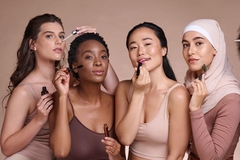Fermentation tech bubbles up sustainable cosmetic molecules and skin microbiome harmony

24 Mar 2023 --- Fermentation technology is advancing as a viable method for producing microbiome-enhancing and environmentally sustainable cosmetic ingredients. PersonalCareInsights speaks to Mibelle Biochemistry about the benefits of fermented ingredients for the skin microbiome, while Amyris explains how precision fermentation is a climate-friendly solution to scaling rare or endangered molecules.
The use of fermented ingredients in personal care products is increasing across all beauty categories, especially in facial skincare, shares Innova Market Insights. Products with fermented ingredients promise better skincare absorption, skin barrier support, sustainability and clean label claims.
“Cosmetics have been manufactured with synthetic chemicals, but the potential harmful effects of these chemicals are considered one of the causes of skin diseases and have recently gained attention,” flags Prof. Dr. Hiroshi Kitagaki, department of environmental sciences at Saga University, Japan and guest editor of a special issue of Fermentation in Cosmetics.

Tapping into historical roots, fermentation may provide an alternative to synthetically processed chemicals. “Fermented foods and products, including lactic acid bacteria, yeast and koji, have traditionally been utilized as cosmetics for a long time,” notes Dr. Kitagaki.
Sugarcane for precision fermentation
Meanwhile, ingredients produced with precision fermentation are hailed for being more sustainable. However, this still requires raw materials to feed the microorganisms used in the fermentation process, and climate change can affect their harvest. To address this problem, Amyris uses renewable, non-botanical sources.
Annie Tsong, Amyris’s chief strategy and product officer, explains sugarcane’s benefits.
“We use rapidly renewable sugarcane as feedstock, which requires less land than conventional agricultural processes and avoids using endangered plant or animal resources. Many of the ingredients we make from sugarcane today require ten times or even 100 times less land than would be required using the traditional botanical source.”
“With the right agricultural practices, sugarcane is one of the most regenerative plants on the planet. The sugarcane we use is grown in Brazil, with abundant sunshine and rainfall, requiring minimal or no irrigation.”
 Fermented products bring harmony to the skin’s microbiome.Tsong continues explaining how bagasse – sugarcane waste – is also used to power its manufacturing plant in Brazil, presenting an upcycling solution for a more circular economy. “Ultimately, Amyris is in a fight for the future of our planet. We know we cannot relentlessly harvest our planet, environment and atmosphere with no consequence.”
Fermented products bring harmony to the skin’s microbiome.Tsong continues explaining how bagasse – sugarcane waste – is also used to power its manufacturing plant in Brazil, presenting an upcycling solution for a more circular economy. “Ultimately, Amyris is in a fight for the future of our planet. We know we cannot relentlessly harvest our planet, environment and atmosphere with no consequence.”
She touts that Amyris’ sugar cane is Bon Sucro certified. The organization is founded by the World Wildlife Fund that has clear criteria for ethical and sustainable sugarcane production.
On the other hand, Dr. Franziska Wandrey, head of research at Mibelle Biochemisty alludes that fermentation should not be based on carbon sources.
“If carbon sources are used – that which can be used for other products such as food – there is no benefit for the climate. If the raw material is derived from waste streams, there is at least a zero balance, as the waste otherwise might produce carbon dioxide as well,” she adds.
Fermentation enhances molecule absorption rate
Bernhard Henes, head of product development at Mibelle Biochemistry, explains that fermentation processes might help create molecules that are more accessible and therefore more beneficial for the skin microflora.
“Alternatively, by removing certain molecules through fermentation, the resulting prebiotic might only be used by certain microorganisms, which could alter the composition of the skin microflora.”
Researchers from Japan share that the skin is inhabited by about 102 to 107 cells per square centimeter alongside 1,000 species of commensal bacteria, fungi, viruses and other microorganisms.
“Japanese traditional fermented stuff, used as foods in Japan for over 1,300 years, is now being applied as fermented cosmetics. Fermented cosmetics are expected to have multifaceted health functionality and continue growing as products in the natural skincare market.”
On the other hand, Tsong elaborates on Amyris’ flagship ingredient Squalane, a high-performance moisturizer with a molecular structure similar to squalene, which humans make naturally. The compound contributes to skin health due to its highly effective moisturizing properties and ability to serve as a carrier for other ingredients.
“In addition to hydration and emollience, we’ve shown that Squalane promotes skin microbiome diversity and is in fact, certified as “microbiome-friendly,” she details.
Fermentation as a process
Fermented products bring harmony to the skin’s microbiome. “With fermentation you get smaller molecules that can, in general, be used by more microorganisms and faster as well,” explains Wandrey.
She adds that the primary chemical process of how microorganisms transform raw materials into active ingredients is by degrading carbon sources as carbohydrates (sugars) to smaller molecules.
Microorganisms like yeast or bacteria break down substances into simpler and smaller parts, making them easier to penetrate the skin more deeply, explains HaruHaru Cosmetics.
“Metabolites such as fatty acids and glycerol released by indigenous skin bacteria have been reported to have functional properties for skin health. Therefore, skin-domesticating bacteria and the metabolites derived from those bacteria are used in many skincare product ingredients and function as probiotic cosmetics,” find the Japanese researchers. Products made from precision fermentation are hailed for being more sustainable.
Products made from precision fermentation are hailed for being more sustainable.
On the other hand, the Korean cosmetic brand HaruHaru harnesses fermentated ingredients from black rice, bamboo shoot bark and red ginseng.
Black rice, used in HaruHaru’s Black Rice line, is already rich in antioxidants, but once fermented, its anti-oxidation power has over 30 times the antioxidant effect of white rice. Black rice has 16 times higher antioxidant amounts than black beans, adds the brand.
Microbiome-friendly ingredients and claims are steeply rising at an average annual growth rate of 41% since 2018, finds Innova Market Insights. Europe leads in global microbiome-friendly ingredients and claims at 65%. Most of the products in the category are in skincare, with hair care being the fastest-growing tracked with the ingredient or claim.
On the other hand, Amyris uses its Lab-to-Market platform to leverage precision fermentation “to create sustainable, pure, efficacious ingredients that deliver superior results without depleting our natural resources,” notes Tsong.
“To make Squalane, we programmed the yeast Saccharomyces cerevisiae to consume sugar and turn it into a molecule called farnesene. We then do a simple chemical conversion of farnesene into squalane.”
“Our Squalane is indistinguishable from squalane produced using other methods – such as harvesting from shark livers or from plants,” she comments.
Popular ingredients from precision fermentation
Tsong spotlights Amyris’ Squalane ingredient as the company’s best and most widely used by cosmetic companies worldwide – in many products such as makeup, skincare and hair care.
“A second top ingredient would be our Hemisqualane – our innovative solution to global concerns about the toxicity of silicones and their negative impact on the environment,” she highlights.
“Silicones have been essential components of personal care and beauty for decades, but certain silicones are suspected of accumulating in waterways and bioaccumulating in aquatic life, leading to a ban in the EU for many applications.”
Bisabolol is noted as Amyris’ third-ranked high performing ingredient – popular for hundreds of years because of its skin healing anti-microbial, anti-inflammatory and anti-irritant properties, according to Tsong.
“The molecule is traditionally sourced from either the German chamomile (Matricaria recutita) or more commonly, the Brazilian Candeia tree,” she details. “The limited availability of the Candeia tree also leads to significant price instability and fluctuations in product supply.”
“Through fermentation, Amyris produces the highest purity Bisabolol available today. We use it in formulations across several skincare and haircare products in our consumer brands, including Biossance, Pipette, Rose Inc, Stripes, JVN and 4U by Tia.”
By Venya Patel













